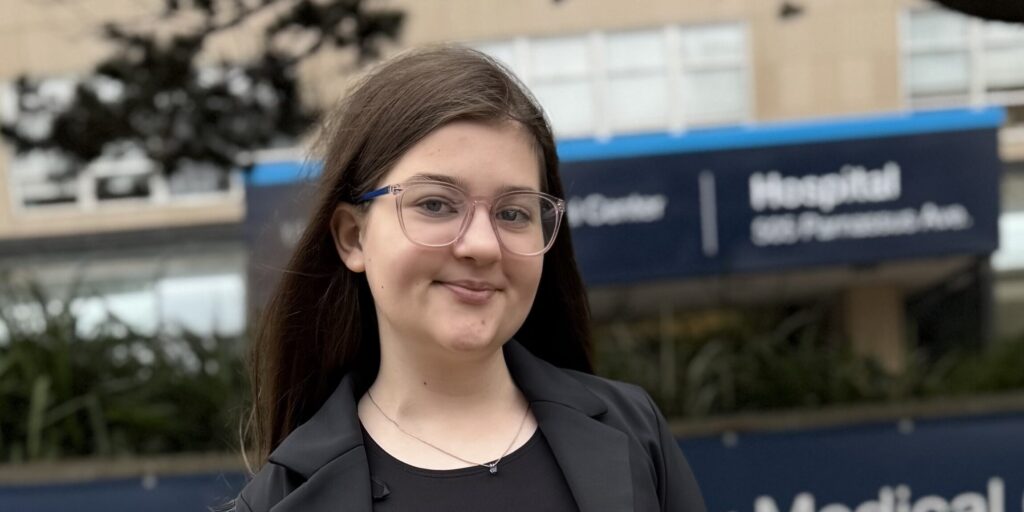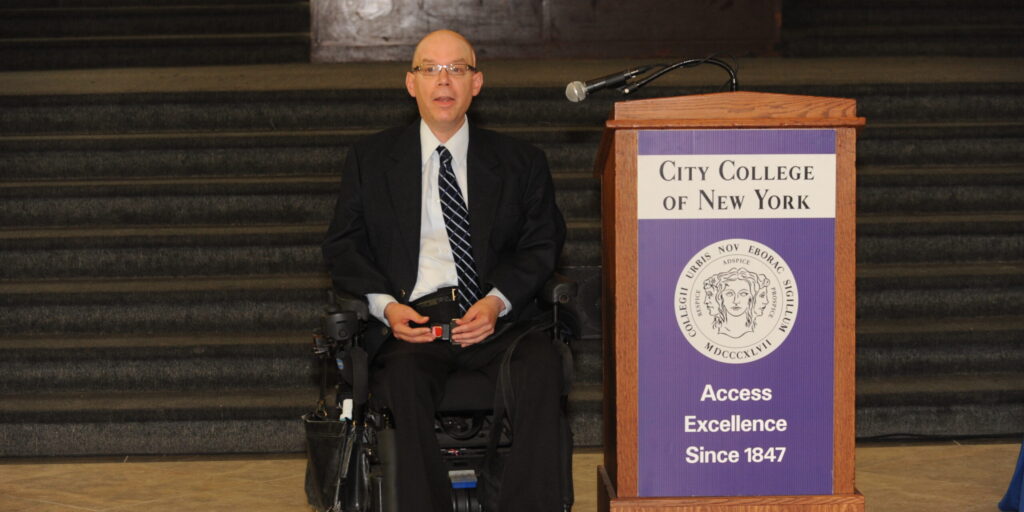
Quest for Success: Dr. Chris Rosa
By Rebecca Hume | Monday, October 31, 2022
5 Second Summary
Quest for Success explores the different paths that individuals with neuromuscular disease have taken to reach their potential and pursue dreams. This series spotlights individuals from our community and shares their journey to independence and accomplishment.
As the Muscular Dystrophy Association (MDA) continues our commitment to empowering people living with neuromuscular disease, we are excited to share our 2022 blog series: “Quest for Success”.
Success looks different to everyone and this monthly blog details the different paths that individuals with neuromuscular disease have taken to reach their potential and the steps they took to get where they are today. Each month we spotlight one individual from our community and share his or her journey to independence and accomplishment. We hope that these stories empower and inspire our readers to unlock the possibilities in their own lives…because the possibilities are limitless.
The Viscardi Center’s President and CEO’s Lifelong Commitment to Accessibility and Inclusion
A true advocate for inclusion and empowerment, Dr. Christopher Rosa’s eloquence, passion, and persistence are evident in both his personal and professional achievements. Chris was initially diagnosed with Duchenne muscular dystrophy in the mid-1970s, but as testing and diagnosing evolved over the years his diagnoses was properly identified as limb girdle muscular dystrophy (LGMD). Growing up on the cusp of the disability rights movement, Chris embraced the opportunity to access higher education, pursue his impressive career goals, and create a valuable and powerful connection with his community. He credits that community connection and his advocacy work with opening doors and guiding his way along his quest for success.
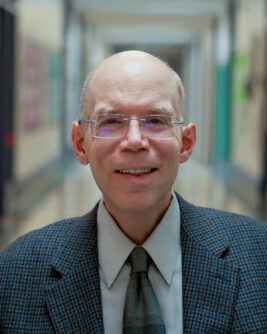
Dr. Christopher Rosa, CEO and President of the Viscardi Center
Chris initially planned to pursue a career as a lawyer but then found his true calling: to serve Americans with disabilities and make substantial change for inclusion in education and employment. He currently serves as the President and CEO of the Viscardi Center, a role that he describes as his dream job and the opportunity of a lifetime. Prior to accepting his position at Viscardi, Chris spent 28 years overseeing and improving inclusion and accessibility in academia as the Vice Chancellor of Student Affairs for Student Inclusion at his alma mater, the City University of New York (CUNY).
He shares that the greatest lesson that he learned when setting, chasing, sometimes changing, and achieving goals is the importance of always doing a “heart check” to ensure that your goals resonate with your core values, beliefs, and passions.
Early value on inclusion
Chris attended elementary and secondary school as a first-generation IDEA student. The IDEA, Individuals with Disabilities Education Act, was passed in 1975 to ensure that students with disabilities were granted access to education and accommodations for their individual needs. Chris’s parents acted as incredible advocates for Chris and his brother, who shares his diagnosis. His parents had clear expectations that their children would have the same opportunity as other children at school, receiving a rigorous education at every level and inevitably pursuing a higher education. His parents’ fierce love for their children fueled a passion for inclusion that today would easily be identified as advocacy but was uncharted territory at the time.
“I think that today my parents would quickly be introduced to a community of other parents,” Chris says. “At that time, they had no paradigm to follow. But they had big dreams for me, and they refused for me to be denied those dreams.”
During the early years of his education, the biggest accommodation that Chris required pertained to classroom location. Chris started using a manual wheelchair when he was 12 years old; he could ambulate for short distances until he was 18 years old and then transitioned to a power wheelchair. But he was unable to access the fifth and sixth grade classrooms that were located on the fourth floor of his school and his parents fought to have his classroom relocated to the first floor. While his mother initially received push back, Chris credits the progressive thinking of the school’s principal for recognizing that this accommodation was easy and necessary to meet.
By the time he reached junior high and high school, Chris required the support of a paraprofessional for activities of daily living and personal assistance. He was successful in securing supports while being main streamed in honors classes. He was part of his high school student government, which aligned with his early goals of becoming a lawyer.
College life and a taste for advocacy
Chris attended Queens College, part of the CUNY system, during a new era of federal funding provisions for meaningful access for people with disabilities to attend college. As an undergrad, Chris quickly became active with the disability community and became part of the grassroots campaign for the Americans with Disabilities Act (ADA). Emboldened by the passion and purpose that he found in advocacy, Chris realized that his initial goal of pursuing a legal degree did not speak to him in the same way that disability rights did.
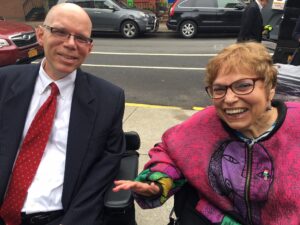
Dr. Chris Rosa with disability rights activist, Judith Heumann
“In the course of my activism, I found my calling and my family,” Chris says. “I found that I was part of a movement much larger than myself. And I found that even more than part of a movement, I was part of a burgeoning American disability culture. And that really became my passion; and it became the source of my scholarship and my doctoral work as well.”
His doctoral work was based upon a phenomenological study on how Americans with disabilities create their own culture. A culture that presents alternative understandings of what it means to live with a disability and replaces the stigmatized vision that has historically been applied by others. While his passion for that culture was developing, Chris continued to advocate for students with disabilities and became the president of the Committee for Disabled Students , the Disabled student organization at his college.
Chris’s involvement with the Disabled student organization predated his role as president, as he worked with the center for students with disabilities to obtain accommodations as a student. He required accommodative testing, extended time for written exams, and some classroom relocations based upon the age of the building or the distance between buildings across the hilly campus. Chris shares that his positive experience with the department went beyond the accommodations that he was granted; the relationships that he made with the Disabled student organization provided an introduction to the disability movement and his first taste of disability culture. Those relationships also led him to accept a position as the director of the office for students with disabilities as his first job after graduation.
A profession fueled by passion
Chris’s involvement with the office and his advocacy work inspired the center to recruit him for the position when they had an opening, a choice that would serve them well. Having been a former recipient of the services proffered by the office that he was directing, he brought a unique understanding of student needs to the role. Chris jumped on the opportunity to broaden inclusion services, became the DEI officer for the college, and helped to diversify the college’s workforce. As he excelled in his first professional role, he began to appreciate that his capabilities were unlimited. He became a student again and earned his doctorate in sociology at CUNY, gaining the threshold credentials for a leadership role in higher education.
Joking that he was “always the bridesmaid, never the bride,” Chris shares that he interviewed for thirteen different dean and vice president positions after earning his doctorate – often making it to the finalist stage but ultimately being passed over for positions. During the interview process, Chris chose to disclose that he was a wheelchair user when scheduling interviews. He also chose, and advises others to do the same, not to disclose accommodation needs until receiving an official offer.
While he didn’t feel that his disability was a deciding factor when employers chose not to hire him, he began to harness the notion that he may have been “typecast” by the work he had done as director of disability services and DEI. He wondered if employers recognized that he was capable of a general leadership role and that his skillsets could prove beneficial in a broader domain.
“I learned the importance of persistence. It was a humbling thing to be successful up to a moment and then feel as though you really hit a wall. You start to wonder if you’ve leveled off,” Chris says. “Through sheer persistence and just continuing to show up, I finally found the right person who understood my value proposition as a candidate.” Chris’s desire to lead was realized when he was offered the role as director of Student Affairs at his alma mater CUNY.
CUNY is a progressive employer, value-centered on ensuring inclusion and accessibility. While Chris did not require day-to-day accommodations to complete his role as director, there were occasions when accessibility needs were unintentionally overlooked. For example, an annual reception held at Queens College’s president’s mansion on Long Island was not structurally accessible for wheelchair users. When Chris addressed this oversight, the college was apologetic and made intentional decisions to hold the event at an accessible location the following year. Chris shares this as an example that accommodation needs may not always occur to others, and it is important to advocate for your needs.
The role of a lifetime
After 28 years in higher education at his alma mater, serving a variety of roles leading to senior leadership, Chris never imagined that he would leave the academic world – until he was offered the role of a lifetime. His initial connection to Viscardi started years earlier after he had met numerous Viscardi school graduates at CUNY, gained interest in the program, and became a member of their school board. His role on the school board led to his colleagues on the board urging him to apply for the CEO position. The opportunity at Viscardi served as an affirmation to the value of staying involved with the disability community and movement.
The Viscardi Center consists of a series of non-profit organizations dedicated to educating and empowering people with disabilities. As CEO, Chris oversees the Henry Viscardi School, Abilities Inc., and the Viscardi Center. He is responsible for leading each organization in developing strategic vision, implementing that vision, and ensuring continuation of financing through philanthropic efforts and state dollars. The Henry Viscardi School provides a free and appropriate setting for students whose needs cannot be accommodated in public district schools due to the need for skilled medical care during the school day. Abilities Inc. is a historic New York organization that offers career readiness services to individuals with disabilities. And last but certainly not least, Chris oversees the Center itself, which is an umbrella organization and the basis for Viscardi’s social enterprise work.
“Our mission is really centered around the empowerment of people with disabilities. We’ve always been very proud that our mission is malleable enough to always endeavor to meet people with disabilities where they are and the arc of their needs,” Chris says.
Chris shares that because Viscardi is designed and run with people with disabilities in mind, the level of accessibility is incredibly liberating. Without the need to exert mental energy into facility and logistical accessibility, Chris is able to focus entirely on completing work tasks and excelling in his role. He describes Viscardi as the most inclusive six acres on the planet. The only accommodation that he required was the need for appropriate and dependable transportation. Chris lives in New York City and the center is located on Long Island; the public transportation between work and home is not reliable. When accepting the position, Chris negotiated an accessible van and driver, stressing that the role of CEO requires the ability to cultivate external relationships and network with people of influence and that transportation is a necessary to do so. Viscardi recognized the need for equity and the value in investing in the success of its employees, especially its CEO, and accommodated Chris’s transportation need.
Navigating independence
Like many working individuals, Chris’s salary disqualifies him for Medicaid home and community-based services. His transition to the working world predated the robust disability benefits counseling services available today and he spent years funneling the majority of his earnings towards his caregiving needs. He advises others to take advantage of benefits counseling through their local Centers for Independent Living (CIL) and Social Security’s Work Incentives Planning and Assistance (WIPA) program.
Chris and his brother live together and can mitigate some of the high out-of-pocket costs for homecare by pooling resources and sharing a team of caregivers. While sharing costs and care with a family member is helpful, caregiving struggles still resonate deeply with Chris and he is passionate about the need for system reform. “The system is in disrepair. And it is broken. And it keeps people with disabilities consigned to poverty and to be excluded,” Chris says. “I think that the next great disability rights movement is going to be uncoupling assets limits from access to community-based care. We need it in order to get out of bed and go to work and live lives fully included in our communities.”
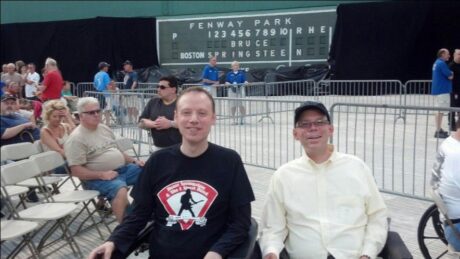
Chris Rosa and his brother, Gian, at a Bruce Springsteen concert
The disability rights movement is a powerful medium for change – and as Chris can attest, also offers an incredible sense of community and belonging. His connections within the community have created many professional and personal opportunities, including the development of significant relationships with friends and mentors. Finding people with whom he can share his journey and developing deep personal friendships within the disability community provides Chris with a sense of shared accomplishments.
He urges others within the community to dream big, pointing out that they need not rely on the heroic efforts of one or two individuals (parents or otherwise) because there is a whole movement of community insisting that they be included.
“There is a national community of peers and advocates who long for the same thing. Who are working together to create opportunity for each other,” Chris says, when asked what advice he would give to someone with a disability who is feeling unsure about their ability to pursue their own career goals. “There are a lot of us in our MDA community and beyond who are sitting alongside you and will help to show you the way.”
Disclaimer: No content on this site should ever be used as a substitute for direct medical advice from your doctor or other qualified clinician.



